Five years ago, I thought landing a DevOps job was just about knowing the right tools. Boy, was I wrong. The real money isn’t in what you know—it’s in understanding how the game actually works.
I walked into my first salary negotiation talking about my Python skills and walked out with the same disappointing offer. Six months later, armed with metrics showing I’d cut deployment time by 75%, I got a 30% raise at a different company. That’s when it clicked—this field rewards impact, not just technical knowledge.
According to Coursera’s DevOps Engineer Salary Guide, Data from Grand View Research shows that DevOps will expand by 16.8 percent yearly growth between 2023 and 2030, with most of this growth coming from adopting cloud technologies.
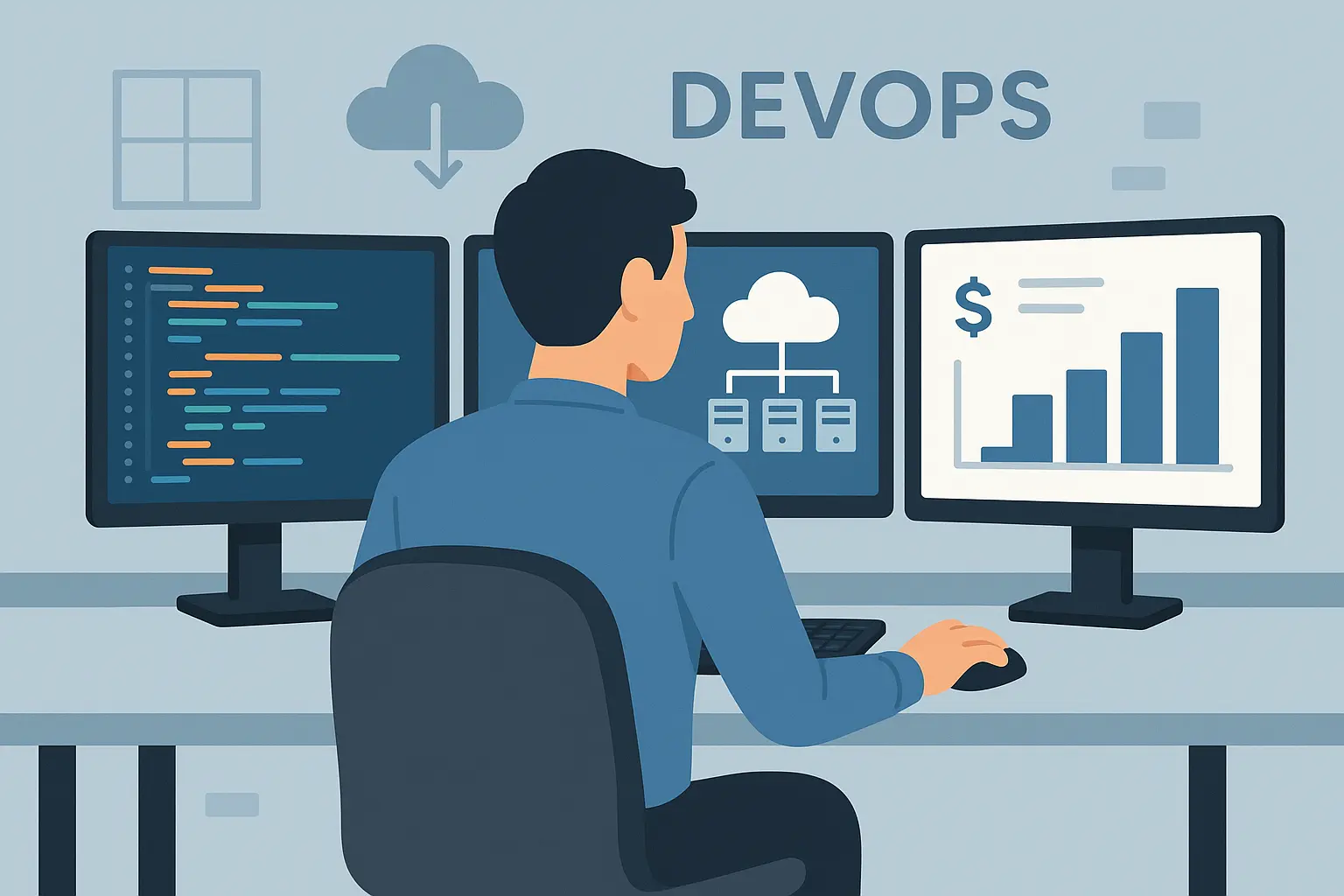
Table of Contents
-
Understanding the Real DevOps Salary Picture
-
Why Your Specialization Makes or Breaks Your Paycheck
-
The Art of Getting Paid What You’re Actually Worth
-
How Company Size and Industry Shape Your Compensation
-
Remote Work’s Impact on DevOps Salaries
-
Future-Proofing Your DevOps Career and Earnings
-
When Your Educational Credentials Matter Most
TL;DR
-
Entry-level DevOps engineers start around $70K-$95K, while senior professionals earn $130K-$180K+ depending on location and specialization
-
Cloud expertise, DevSecOps skills, and platform engineering command the highest salary premiums (15-25% above generalist roles)
-
Geographic location still matters significantly, but remote work is leveling the playing field
-
Tech companies and financial services consistently offer the best compensation packages
-
Showing your boss how you save money with concrete metrics is crucial for successful salary negotiations
-
Strategic certifications can provide immediate 10-20% salary bumps when chosen correctly
-
Total compensation often includes substantial equity and benefits that can double your effective earnings
Understanding the Real DevOps Salary Picture
Here’s what nobody tells you when you’re starting out: the salary landscape isn’t straightforward at all. I spent my first year focusing only on base salary numbers, completely missing the bigger picture that actually determines your paycheck.
The DevOps job market has exploded over the past few years, creating crazy demand for professionals who can bridge development and operations teams. I’ve watched colleagues jump between companies and see their salaries increase by 30-40% simply because they understood market timing. The key insight? Demand consistently outpaces supply, giving skilled professionals serious leverage.
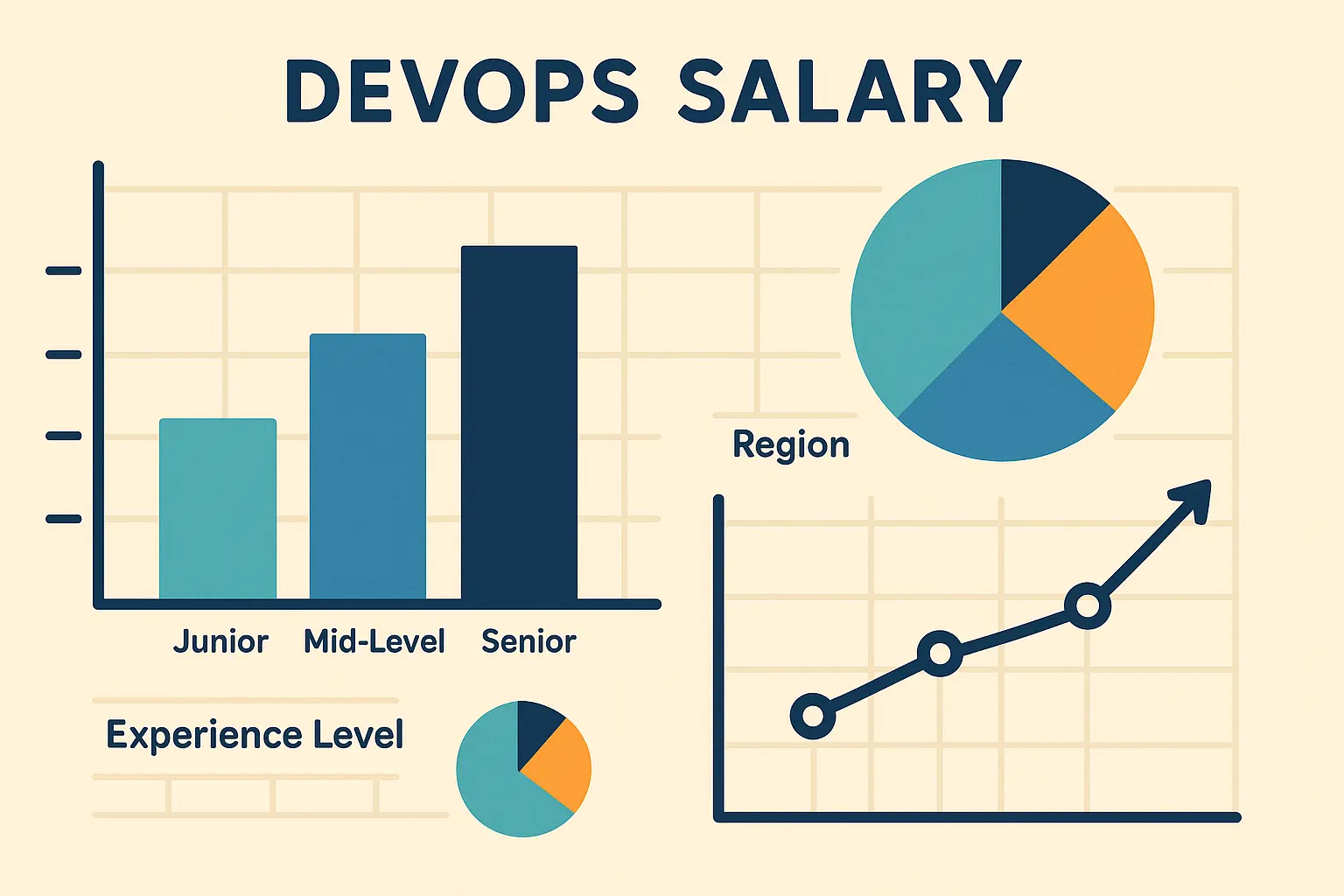
What the Current Market Actually Looks Like
According to Built In’s DevOps Engineer Salary Data, the average salary for a DevOps Engineer in US is $132,629, with the average additional cash compensation being $16,602, bringing the average total compensation to $149,231.
What surprised me most was how quickly you can move between salary brackets. Traditional IT career paths require years of incremental progress, but DevOps rewards skill acquisition and business impact much more directly.
Breaking Down Salary Ranges by Experience
Experience levels in DevOps don’t follow traditional IT career paths. I’ve seen talented professionals jump salary brackets quickly based on skills rather than years of service.
Entry-level positions typically range from $70,000 to $95,000 annually, though this varies dramatically based on your technical background. Mid-level engineers usually earn between $95,000 and $130,000, while senior professionals command $130,000 to $180,000. Principal-level engineers in major tech markets often exceed $200,000 in base salary alone.
Here’s what I’ve learned about accelerating through these ranges: focus on measurable business impact rather than just technical complexity. Companies pay premium rates for engineers who can demonstrate clear ROI on their automation and infrastructure improvements.
|
Experience Level |
Salary Range |
Average Additional Pay |
Total Compensation |
|---|---|---|---|
|
Entry-Level (<1 year) |
$70K – $95K |
$8K – $12K |
$78K – $107K |
|
Mid-Level (2-4 years) |
$95K – $130K |
$12K – $18K |
$107K – $148K |
|
Senior (5-8 years) |
$130K – $180K |
$18K – $25K |
$148K – $205K |
|
Principal (8+ years) |
$180K – $250K+ |
$25K – $40K+ |
$205K – $290K+ |
Take Sarah, a mid-level engineer I know who transitioned from system administration. She started at $85K in her first DevOps role, but by focusing on cloud certifications and automation scripting, she jumped to $125K within 18 months at a different company. Her secret? She documented every cost-saving automation she implemented and presented concrete ROI figures during her job interviews.
Geographic Reality Check
Location still plays a massive role in compensation, though remote work is starting to blur these lines. Silicon Valley and Seattle continue leading compensation charts, often paying 30-40% above national averages. New York and Boston follow closely, while cities like Austin, Denver, and Atlanta offer compelling combinations of solid salaries and lower living costs.
I’ve seen identical roles differ by $50,000+ annually based purely on location. However, remote-first companies are starting to pay based on role value rather than employee location, which creates interesting opportunities for professionals in lower-cost markets.
Here’s how I research geographic variations effectively:
-
Use multiple salary sites (Glassdoor, PayScale, levels.fyi) for cross-reference
-
Filter results by specific metro areas and company sizes
-
Factor in cost of living using calculators like Numbeo
-
Network with local DevOps professionals through meetups and LinkedIn
Why Your Specialization Makes or Breaks Your Paycheck
Certain specializations consistently command premium salaries, and choosing the right focus area can significantly accelerate your earning potential. The biggest mistake I made early was trying to be good at everything instead of becoming exceptional at specific high-value skills.
Once I shifted focus to cloud architecture and security automation, my salary jumped by 25% within six months. Generalist DevOps engineers often hit salary ceilings that specialists easily surpass.
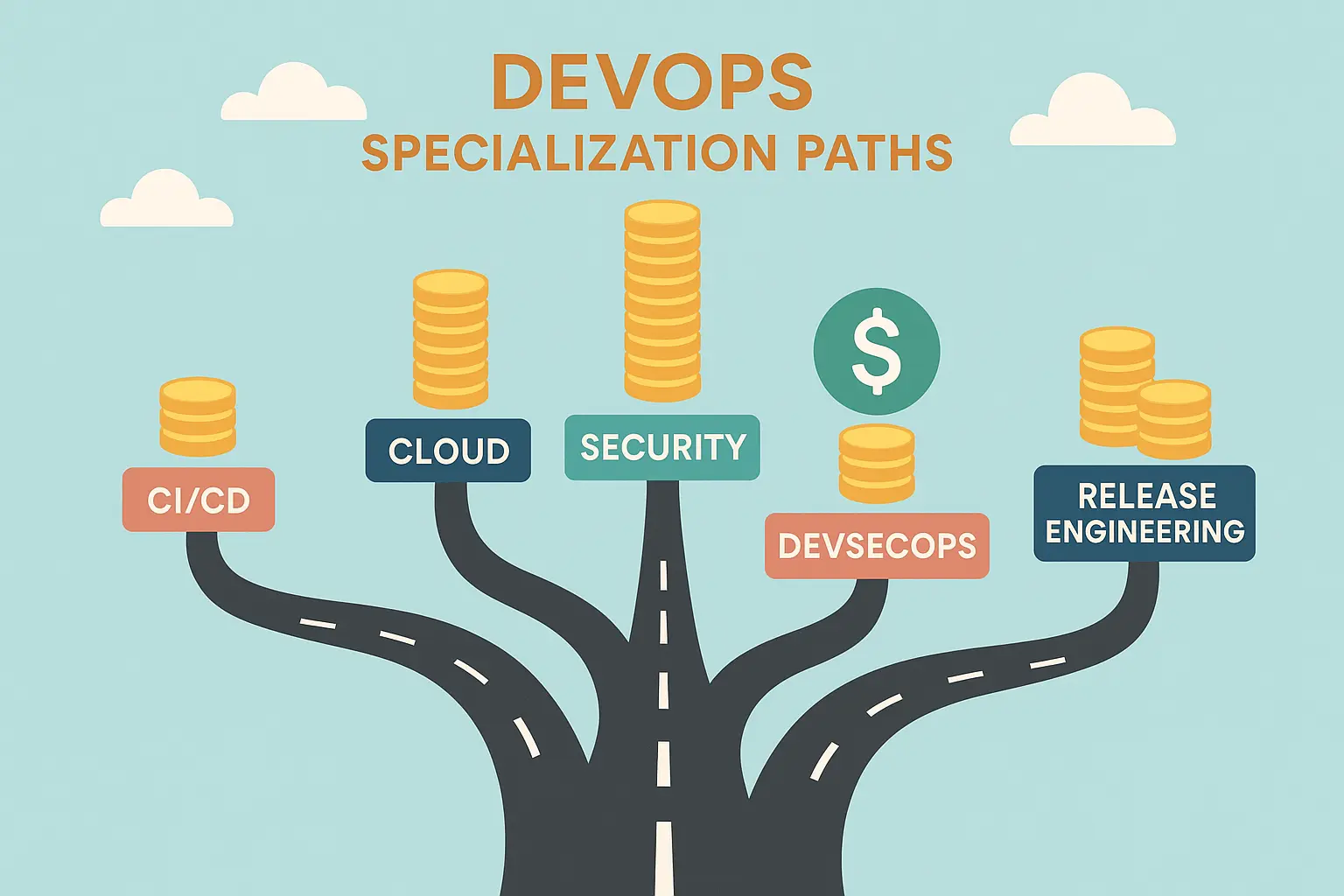
Cloud Expertise Pays the Bills (And Then Some)
Cloud-focused DevOps engineers consistently earn 15-25% more than generalists, and this premium keeps increasing as organizations accelerate their cloud adoption. The key is developing deep expertise in specific platforms rather than surface-level knowledge across multiple clouds.
AWS, Azure, and GCP certifications provide immediate credibility and often translate to salary bumps. However, hands-on experience with complex cloud architectures matters more than certifications alone. Companies pay premium rates for engineers who can design, implement, and optimize cloud infrastructure at scale.
According to Coursera’s DevOps Engineer Salary Guide, cloud DevOps engineers earn an average base salary of $128,890 per year in the US, representing a significant premium over general DevOps roles.
I’ve watched colleagues earn immediate 15-20% raises simply by obtaining AWS Solutions Architect certification and demonstrating practical application in their current roles. The premium for cloud skills continues growing as more organizations migrate their infrastructure.
DevSecOps: Where Security Meets Serious Money
DevOps engineers who focus on security command some of the highest salaries in the field due to the critical nature of cybersecurity in modern infrastructure. Organizations are willing to pay premium rates for professionals who can embed security throughout the development lifecycle.
DevSecOps professionals often earn 20-30% more than traditional DevOps engineers. The combination of security expertise with automation skills creates a rare and valuable skill set that companies desperately need.
Even basic security automation skills can significantly impact your salary negotiations. Companies are increasingly prioritizing security-first approaches, making these skills incredibly valuable in today’s threat landscape.
Platform Engineering: The New Salary King
Platform engineers who build internal developer platforms often earn at the top of the salary spectrum due to their strategic business impact. This emerging specialization combines infrastructure expertise with product thinking, creating immense value for organizations.
Platform engineering roles often come with titles like “Staff Engineer” or “Principal Engineer,” reflecting both the seniority and compensation levels these positions command.
Strategic steps for increasing your specialization value:
-
Research high-demand areas in your target market
-
Obtain relevant certifications but focus on practical experience
-
Build portfolio projects that demonstrate real-world expertise
-
Engage with specialized communities and contribute to open-source projects
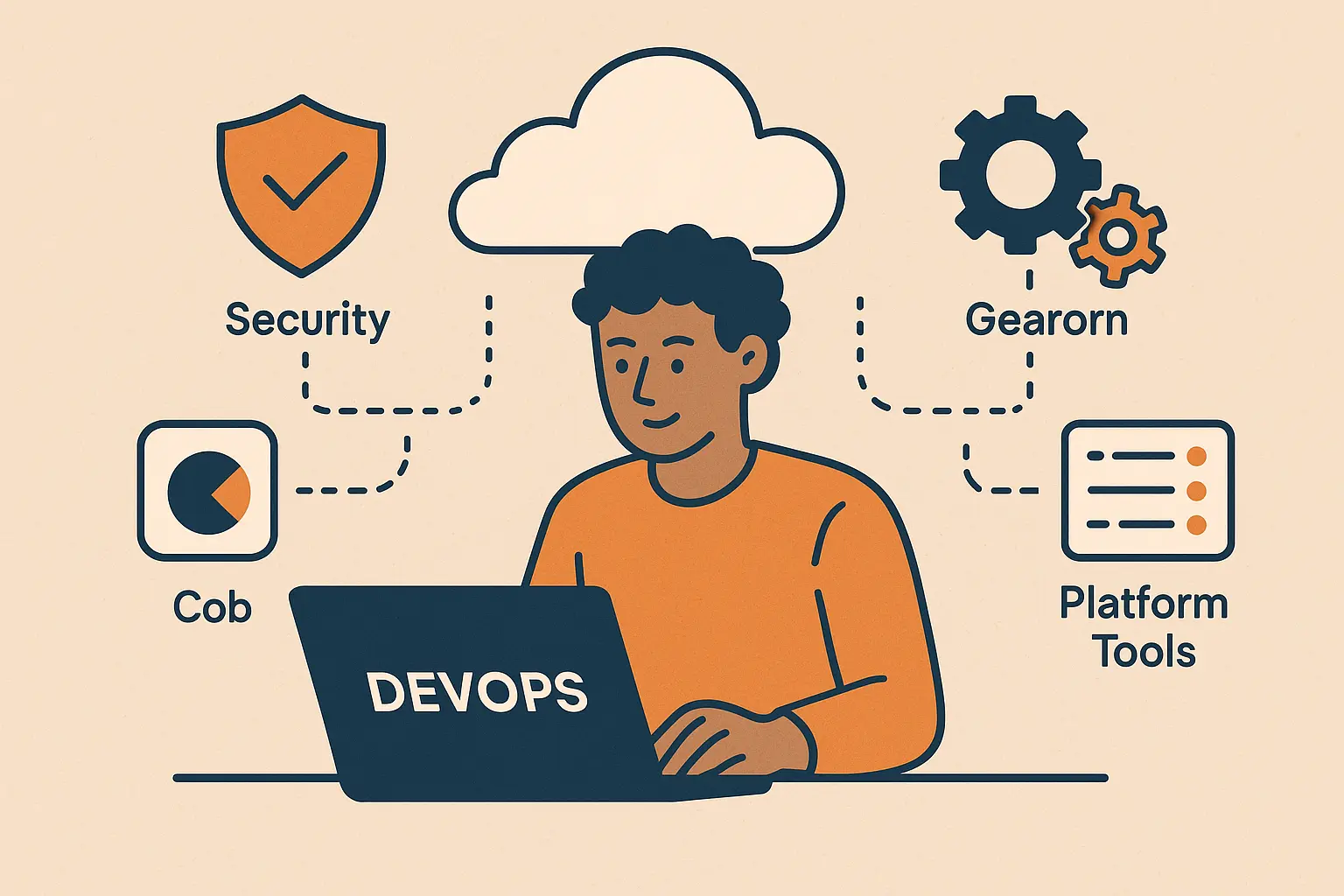
The Art of Getting Paid What You’re Actually Worth
Salary negotiation in DevOps requires a different approach than traditional IT roles. The biggest revelation in my career came when I realized that my salary wasn’t determined by how many technologies I knew, but by how much business value I could demonstrate.
Most DevOps professionals undervalue their contributions because they focus on technical achievements rather than business outcomes. I made this mistake for years before learning to translate my work into language that executives and HR departments actually understand and care about.
Building Your Compensation Case Like a Pro
Every technical improvement you make has a business impact—you just need to quantify it properly. When I started tracking and presenting these metrics, my salary negotiations became significantly more successful.
Turning Your Work Into Numbers That Matter
Track metrics like deployment frequency improvements (from weekly to daily releases), downtime reduction percentages (99.9% to 99.99% uptime), infrastructure cost optimizations (20% AWS bill reduction), and developer productivity gains (reduced build times from 30 to 5 minutes).
The transformation in my negotiations was dramatic once I started presenting these numbers. Instead of saying “I improved our CI/CD pipeline,” I could say “I reduced deployment time by 85% and eliminated 12 hours of manual work per week, saving the company approximately $50,000 annually in developer productivity.”
Consider Mike, a senior DevOps engineer who prepared for salary negotiations by documenting his achievements over 12 months. He showed how his CI/CD pipeline improvements reduced deployment time from 4 hours to 15 minutes, his monitoring implementations prevented 3 major outages (saving an estimated $200K in lost revenue), and his infrastructure optimizations cut cloud costs by 35%. Armed with these metrics, he successfully negotiated a $25K salary increase and a promotion to Lead DevOps Engineer.
Certifications and Skills That Actually Pay Off
Strategic skill acquisition can yield significant salary increases, but not all certifications provide equal return on investment. I’ve learned to focus on certifications that align with market demand and my career goals.
Certifications Worth Your Time and Money
Cloud certifications consistently deliver strong ROI, with AWS Solutions Architect and Azure DevOps Engineer certifications often providing immediate 10-20% compensation bumps. Container orchestration expertise through CKA and CKS certifications also commands premium rates.
I’ve personally seen immediate salary increases after obtaining strategic certifications, but the key is combining them with practical experience. Certifications open doors, but demonstrable expertise closes deals.
Emerging Skills That Set You Apart
Skills in Infrastructure as Code (Terraform, Pulumi), GitOps methodologies, and observability platforms (Datadog, New Relic) are increasingly valuable. These emerging technologies can differentiate you in salary negotiations and open doors to higher-paying positions.
My approach to skill development:
-
Assess current market demands through job postings and industry reports
-
Create a learning roadmap with realistic timelines
-
Practice with real-world projects that solve actual problems
-
Document achievements and metrics for future negotiations
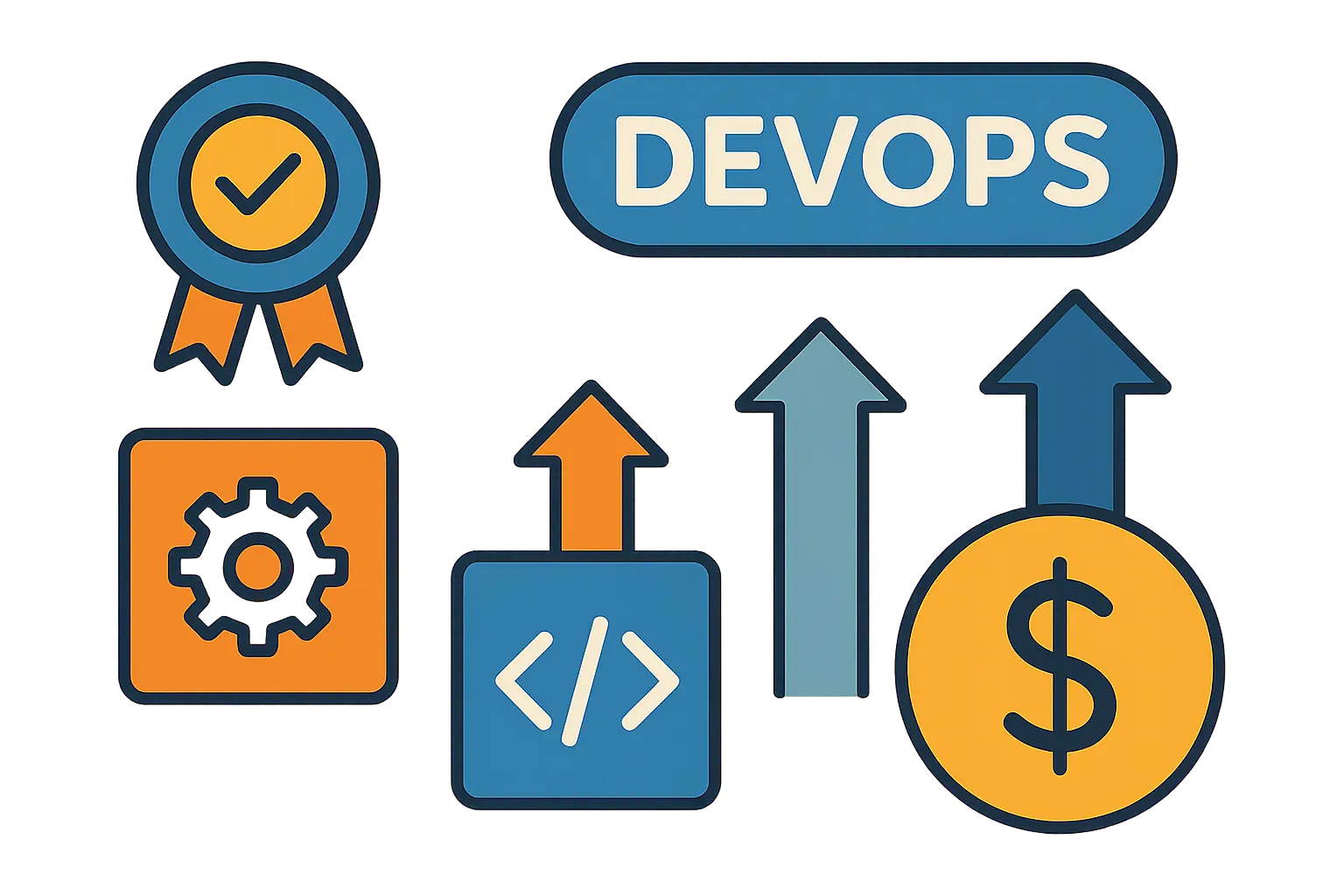
How Company Size and Industry Shape Your Compensation
Salaries vary dramatically across industries and company sizes, with each offering distinct advantages and trade-offs. I’ve worked across different company sizes and industries, and the variation continues to surprise me.
Salaries can differ by 50-100% between industries for identical skill sets. This variation creates opportunities for strategic career moves that can dramatically accelerate your earning potential.
Enterprise vs. Startup: The Great Compensation Debate
Large enterprises typically offer higher base salaries and comprehensive benefits, while startups may provide equity compensation and faster career advancement opportunities. The choice often depends on your risk tolerance and career stage.
Tech Giants and Their Golden Handcuffs
Major tech companies (FAANG and similar) consistently offer the highest DevOps compensation, often 30-50% above market averages. However, these positions come with intense performance expectations and competitive environments.
Salaries at major tech companies can be life-changing, but the total compensation packages are often more complex than they initially appear. Stock options, vesting schedules, and performance bonuses can significantly impact your actual earnings.
Financial Services: Steady Money, Serious Requirements
Banks and financial institutions offer competitive salaries due to regulatory requirements and the critical nature of their infrastructure. These roles often provide excellent work-life balance and job security, though innovation may move slower than in tech companies.
Healthcare and Government: Beyond the Base Salary
These sectors may offer lower base salaries but provide exceptional benefits, job security, and meaningful work. The total compensation package often includes generous healthcare, retirement contributions, and time off policies.
Steps for evaluating opportunities across different sectors:
-
Research industry-specific salary benchmarks using multiple sources
-
Calculate total compensation including benefits and equity
-
Evaluate long-term career growth potential and learning opportunities
-
Assess company culture alignment with your values and work style
|
Industry |
Average Base Salary |
Benefits Rating |
Equity Potential |
Job Security |
|---|---|---|---|---|
|
Tech Giants (FAANG) |
$160K – $220K |
High |
Very High |
Medium |
|
Financial Services |
$140K – $180K |
Very High |
Low |
Very High |
|
Healthcare |
$120K – $160K |
Very High |
Low |
High |
|
Government |
$110K – $150K |
Excellent |
None |
Excellent |
|
Startups |
$100K – $160K |
Variable |
Very High |
Low |
Remote Work’s Salary Revolution
The shift to remote work has created new compensation dynamics that are still evolving. Some companies maintain location-based pay scales while others adopt location-agnostic models, creating opportunities and challenges for DevOps professionals.
Remote work has fundamentally altered how I think about salary negotiations. Geographic arbitrage opportunities exist for professionals willing to work for companies in high-cost markets while living in more affordable areas.
According to DevOps.com’s 2025 Job Market Analysis, 46.5% of DevOps roles are remote but restricted within specific geography, while only 26.6% are strictly in-office roles, showing the significant shift toward flexible work arrangements in the field.
Location-Independent Pay: The New Frontier
Companies adopting location -agnostic pay scales often base salaries on high-cost markets like San Francisco or New York, potentially increasing compensation for remote workers in lower-cost areas. This trend is particularly strong in tech companies competing for top DevOps talent.
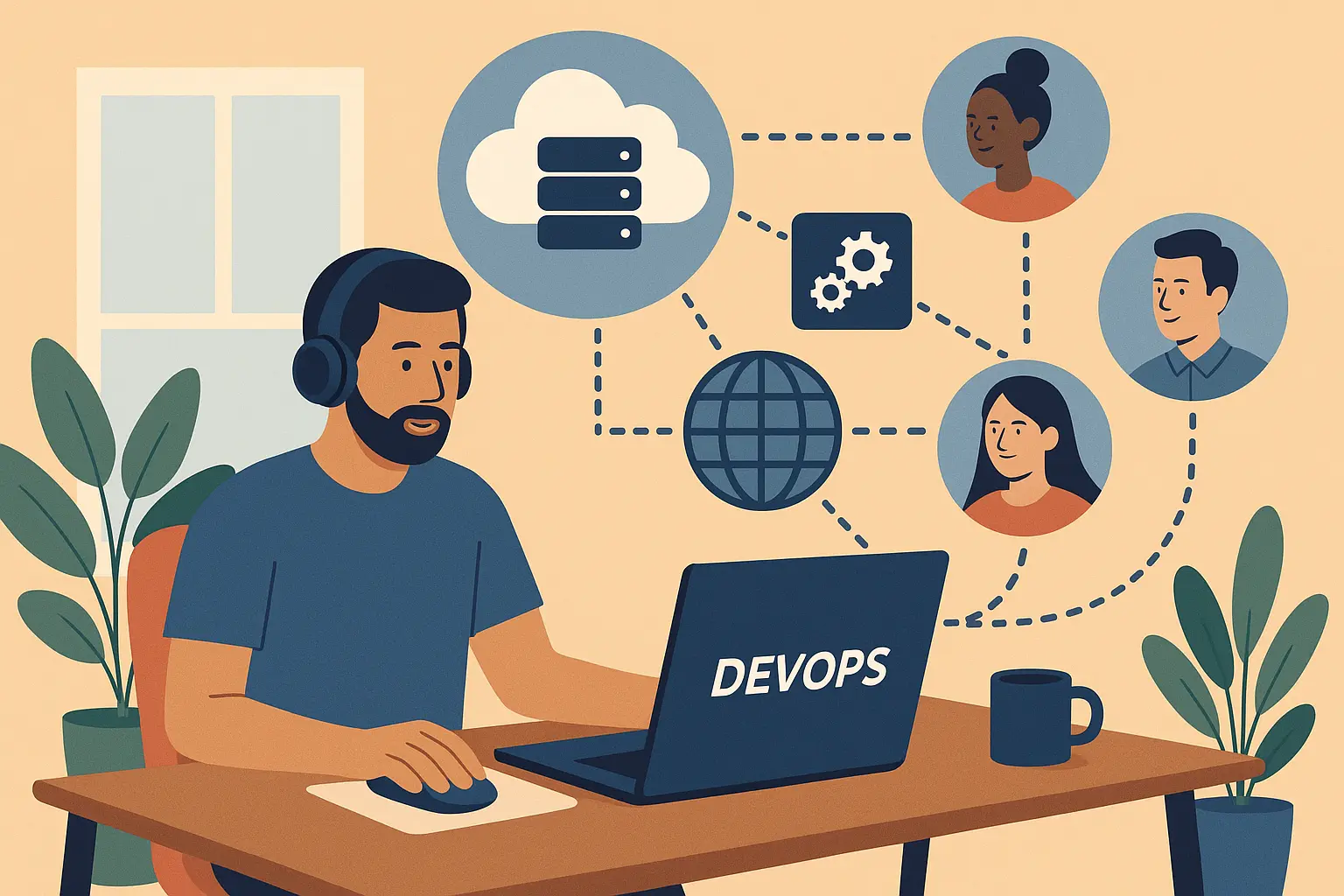
Future-Proofing Your DevOps Career and Earnings
The salary landscape continues evolving with technological advances and changing market demands. Staying ahead of industry trends has been crucial for maintaining my earning potential. The salary growth I’ve experienced came from anticipating market shifts rather than reacting to them after they occurred.
Technology cycles move faster in DevOps than in traditional IT roles, which means both opportunities and risks emerge more quickly. I’ve learned to balance specialization with adaptability to maintain long-term earning potential.
New Roles, New Money
Emerging roles like Platform Engineers, Site Reliability Engineers, and DevOps Architects are creating additional career paths with distinct compensation profiles. These positions often combine traditional DevOps skills with specialized expertise in specific domains.
The evolution of DevOps roles has created salary opportunities that didn’t exist when I started my career. Platform engineering, in particular, has emerged as a high-paying specialization that combines infrastructure expertise with product development skills.
According to Nucamp’s 2024 Tech Jobs Report, DevOps Engineers in emerging markets like Uruguay can earn around $65,000 USD per year in 2024, with experienced professionals potentially earning over $90,000 USD annually, showing the global expansion of high-paying DevOps opportunities.
AI/ML Operations: The Next Big Thing
MLOps and AIOps specializations are emerging as high-value career paths, combining traditional DevOps skills with machine learning expertise. Organizations implementing AI/ML at scale need professionals who understand both the operational and technical challenges of these systems.
My framework for future career planning:
-
Monitor industry trends through conferences, blogs, and professional networks
-
Develop adaptable skill sets that transfer across emerging technologies
-
Build relationships across different specializations and industries
-
Consider leadership and mentoring opportunities to expand your impact
Beyond Individual Contributor: Leadership Paths
Senior DevOps professionals often face decisions about technical versus management career tracks. Both paths offer substantial earning potential, but require different skill sets and provide different types of satisfaction and challenges.
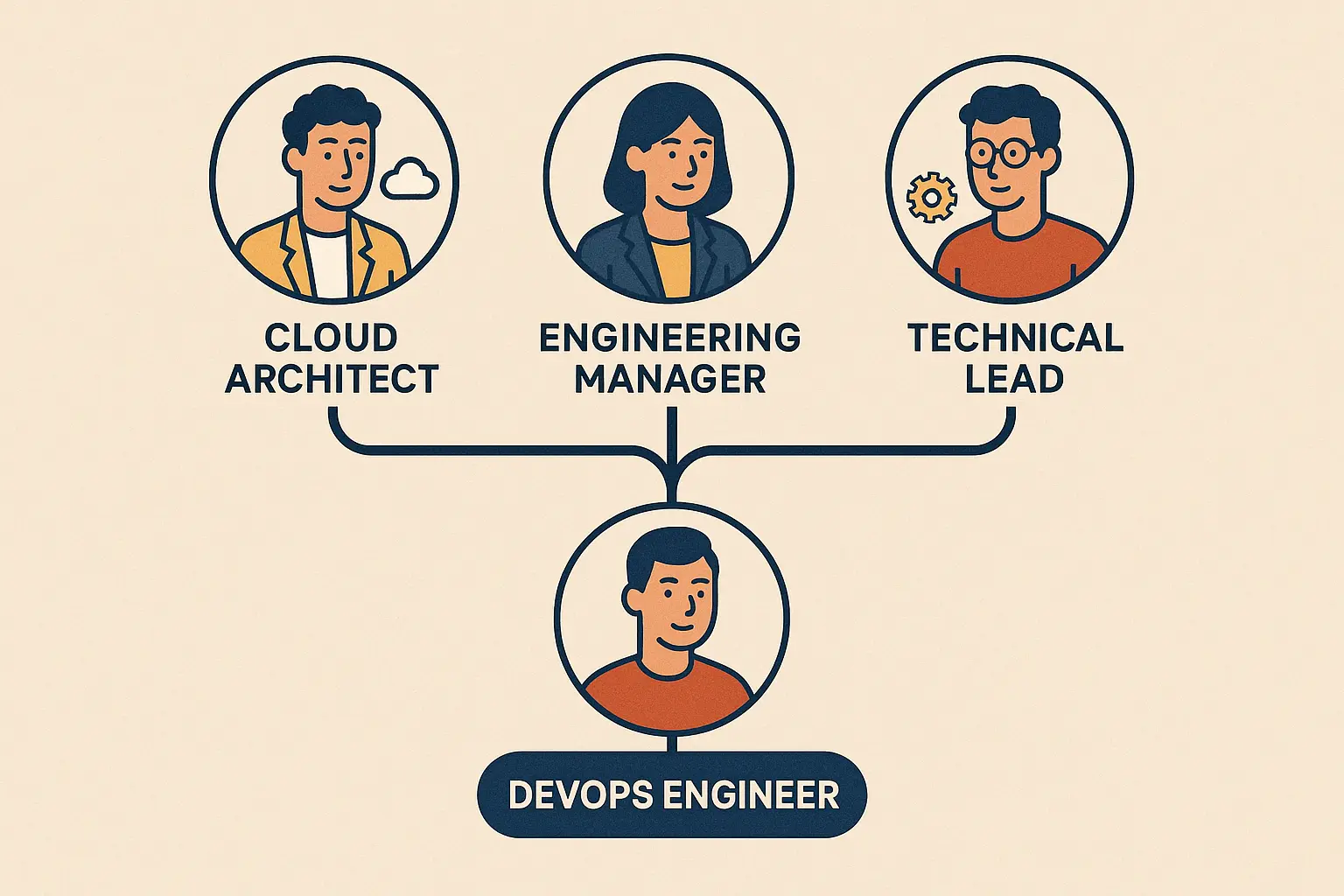
DevOps Software Engineer: Where Coding Skills Meet Big Paychecks
DevOps software engineers who maintain strong coding abilities alongside infrastructure expertise often command premium salaries compared to pure operations-focused DevOps professionals. The ability to write code and manage infrastructure creates a unique value proposition that companies are willing to pay extra for.
Combining software development skills with DevOps expertise has been one of the most lucrative decisions in my career. The salary premium reflects the dual skill set required and the direct impact on developer productivity.
Development-Heavy Roles That Pay More
Professionals who write automation tools, contribute to CI/CD pipelines, and develop infrastructure management software typically earn 10-15% more than traditional DevOps engineers. This premium reflects the dual skill set required and the direct impact on developer productivity.
The salary advantage comes from being able to solve problems that pure operations or pure development professionals cannot address effectively. You become a bridge between worlds, which companies value highly.
Full-Stack DevOps Engineering
Engineers who can handle both application development and infrastructure automation are increasingly valuable, with salaries often matching senior software engineers. These roles require deep technical skills in multiple domains but offer exceptional career flexibility and earning potential.
Steps I recommend for transitioning into DevOps software engineering:
-
Strengthen programming skills in Python, Go, or JavaScript through practical projects
-
Contribute to open-source DevOps tools to build credibility
-
Develop custom automation solutions that solve real business problems
-
Create internal tooling that improves developer experience and productivity
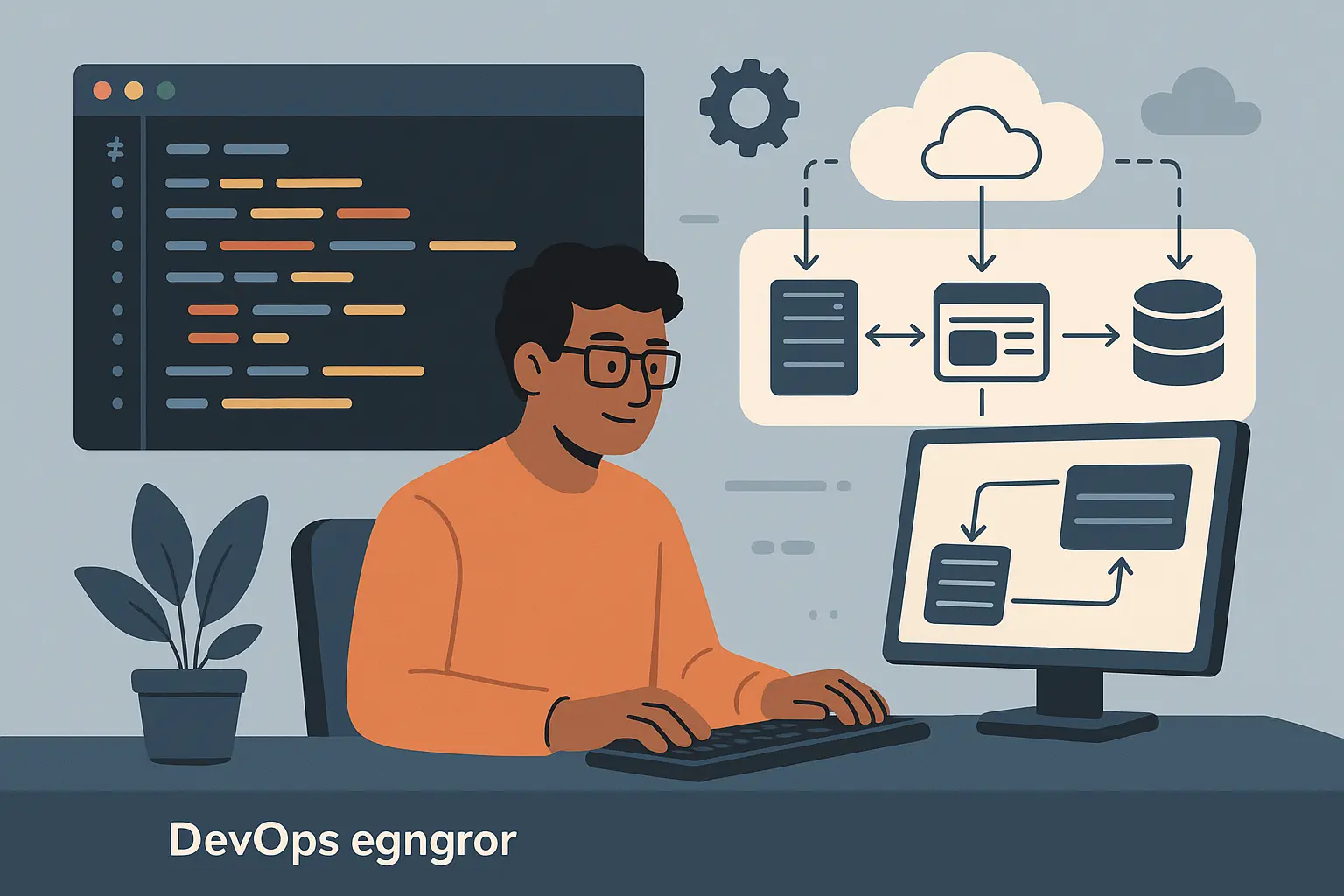
Age, Experience, and the DevOps Salary Curve
The relationship between age, experience, and salary in DevOps follows unique patterns compared to traditional IT roles. Rapid advancement is possible for skilled practitioners regardless of age, making this field particularly attractive for career changers and young professionals alike.
Age discrimination exists in tech, but I’ve found DevOps to be more merit-based than many other technical fields. Your earning potential depends more on demonstrable skills and business impact than on years of experience or age.
Fast-Track Career Growth
DevOps professionals can achieve significant salary growth within 2-3 years due to the field’s emphasis on practical skills over tenure. I’ve witnessed engineers double their salaries by focusing on high-impact skills and strategic job changes.
The acceleration potential in DevOps continues to amaze me. Traditional career progression models don’t apply when you can demonstrate clear business value through automation and infrastructure improvements. Your salary can jump dramatically with the right combination of skills and timing.
Avoiding Mid-Career Salary Plateaus
Salary stagnation happens when professionals stop growing their skills or fail to communicate their increasing value. Avoiding this requires continuous learning and strategic role transitions, often involving management or specialized technical tracks.
My approach to continuous growth:
-
Set annual salary and skill benchmarks to track progress
-
Actively seek stretch assignments and new responsibilities
-
Evaluate management versus technical leadership paths regularly
-
Conduct quarterly market positioning assessments
Consider Jennifer, a 45-year-old career changer who transitioned from network administration to DevOps. Despite starting “late” in her career, she focused intensively on containerization and cloud technologies. Within three years, she progressed from a $75K network admin role to a $140K Senior DevOps Engineer position by demonstrating measurable business impact and staying current with emerging technologies.
Total Compensation: The Full Picture Beyond Base Salary
Understanding the complete compensation package is crucial for DevOps professionals, as benefits, equity, and bonuses can significantly impact total earnings. Many engineers focus solely on base salary and miss substantial value in other compensation components.
The biggest financial mistake I made early in my career was evaluating job offers based only on base salary figures. Total compensation packages can vary by 50-100% even when base salaries appear similar.
Equity and Stock Options That Actually Matter
Technology companies often provide substantial equity compensation that can double or triple effective annual compensation for DevOps engineers. However, understanding vesting schedules, tax implications, and company valuation is essential for making informed decisions.
Bonus Structures Across Different Companies
Performance bonuses, retention bonuses, and project completion incentives vary widely across organizations and can add 10-30% to base compensation. Understanding how these bonuses are calculated and paid helps you evaluate total earning potential accurately.
Benefits That Add Real Value
Health insurance, retirement contributions, professional development budgets, and flexible work arrangements contribute significant value beyond salary figures. I’ve learned to quantify these benefits when comparing job offers or negotiating compensation.
My framework for evaluating total compensation:
-
Calculate equity value using conservative estimates and realistic timelines
-
Quantify benefits value including health insurance, retirement matching, and PTO
-
Consider professional development opportunities and their long-term career impact
-
Assess work-life balance impact on overall quality of life and career sustainability
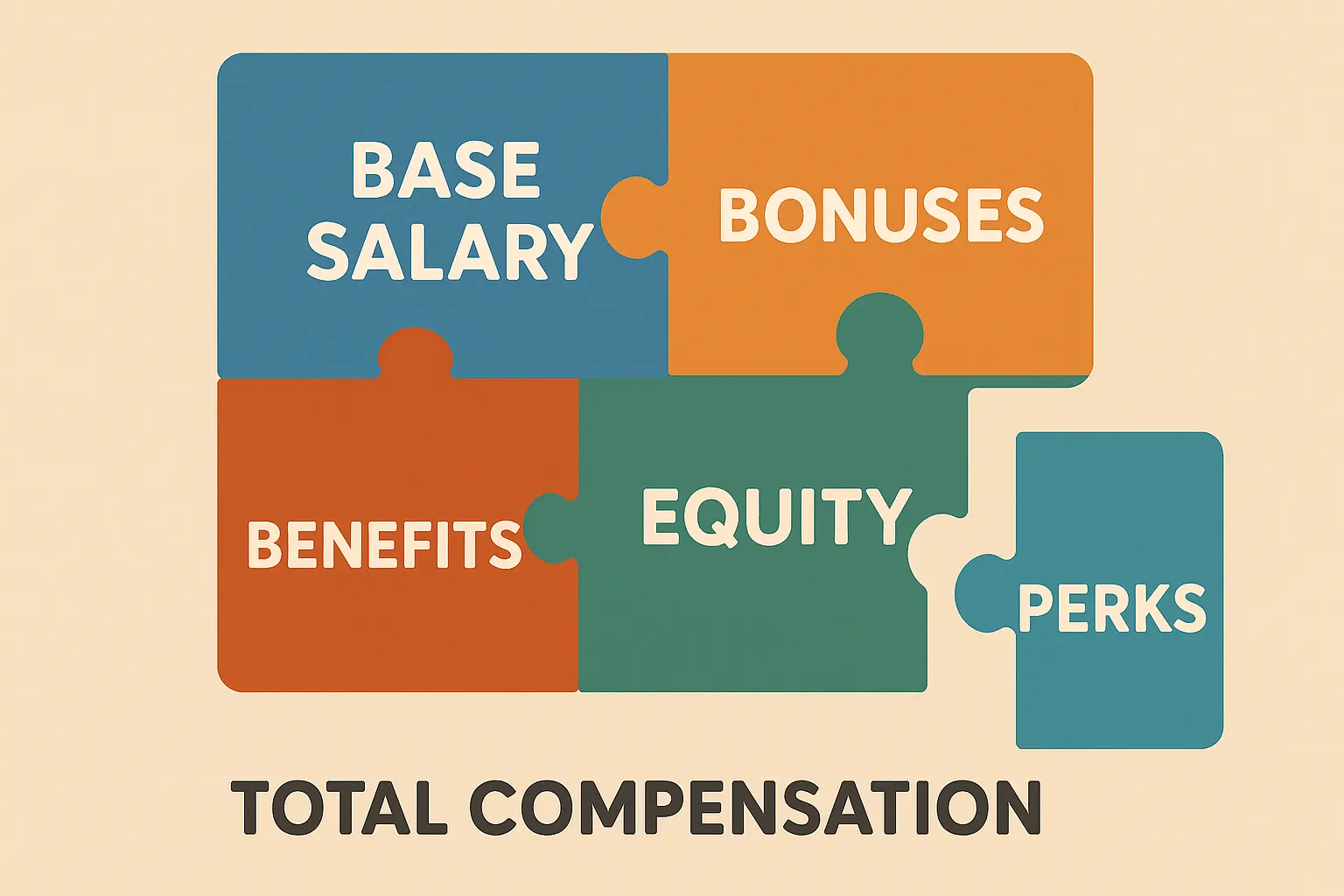
When Your Educational Credentials Matter Most
While DevOps heavily emphasizes practical skills over formal education, there are specific situations where having proper documentation of your educational background becomes crucial for career advancement and salary negotiations.
Professional presentation matters more than many DevOps engineers realize, especially when interviewing for senior positions or working with traditional enterprises. Having your educational achievements properly documented and displayed can provide credibility during salary discussions and career transitions.
Salaries can be influenced by educational credentials in certain contexts, particularly when working with government contractors or large enterprises that have formal education requirements.
Many professionals find that investing in formal education can significantly impact their earning potential, while others need to properly display their certifications to maintain professional credibility during salary negotiations.
ValidGrad understands that DevOps professionals sometimes need replacement documentation for educational milestones that launched their careers. Whether you’ve completed coding bootcamps, technical certifications, or degree programs that provided your foundation in DevOps, having professional-looking replacement documents can be valuable for:
-
Creating an impressive home office setup for remote work interviews
-
Maintaining backup copies while keeping originals secure
-
Replacing damaged documents that hold personal significance
-
Professional displays that showcase your educational journey
ValidGrad’s customizable diploma services provide high-quality replacement documents for display purposes, helping you maintain a professional image that complements your DevOps expertise and salary negotiations.
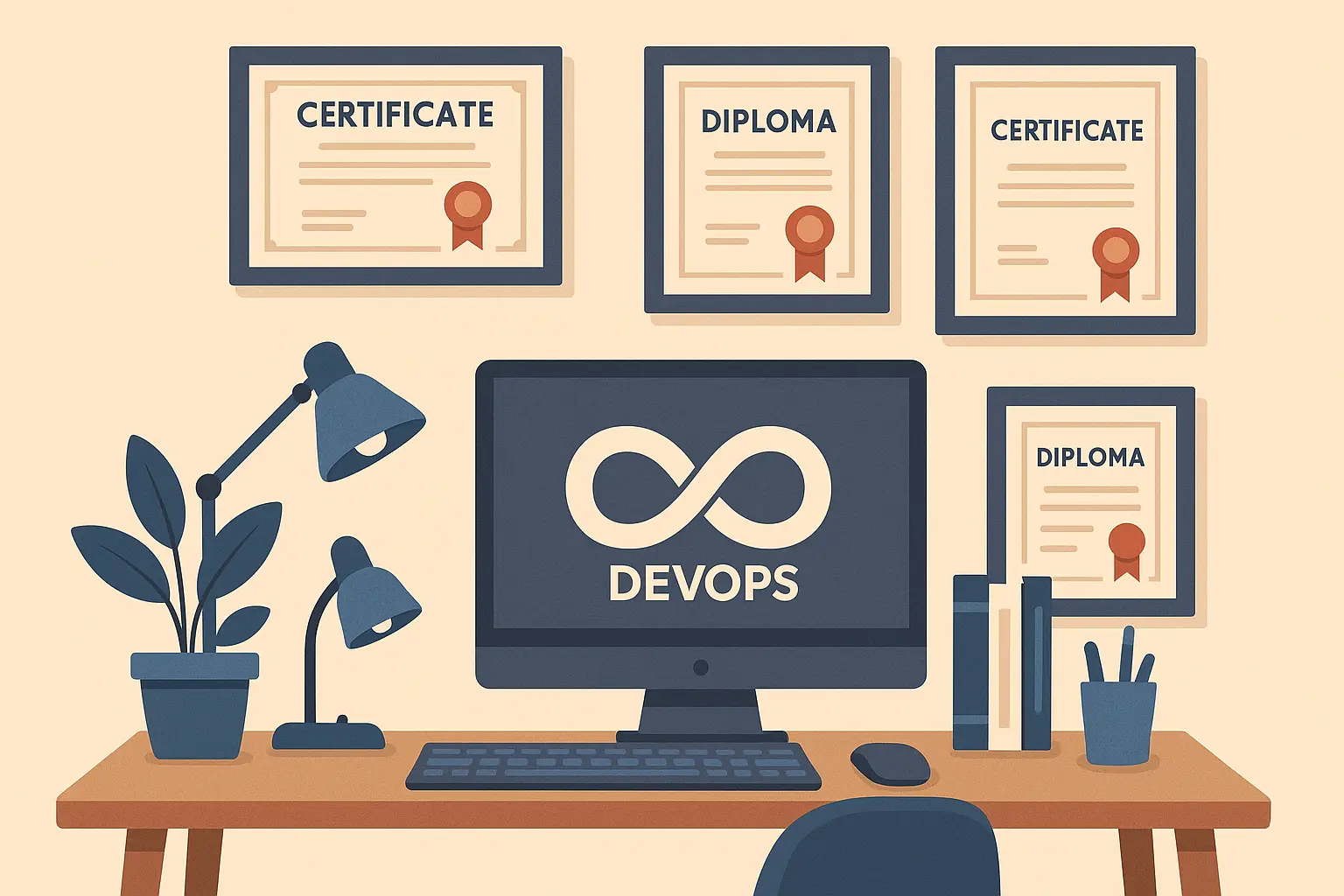
Final Thoughts
Understanding salary dynamics has been one of the most valuable investments in my career. This field offers incredible earning potential, but maximizing that potential requires strategic thinking about specialization, skill development, and career positioning.
What I’ve learned is that salary growth in DevOps isn’t just about technical skills—it’s about understanding business impact, choosing the right specializations, and effectively communicating your value. The professionals who earn the highest salaries are those who can bridge technical expertise with business outcomes.
The salary landscape will continue evolving as new technologies emerge and business needs change. The key is staying adaptable while building deep expertise in areas that provide lasting value to organizations.
Here’s your homework: This week, start tracking one metric that shows your impact. Next month, research salaries for your dream role. In three months, have that conversation with your boss. The market’s hot, and you’re worth more than you think.
